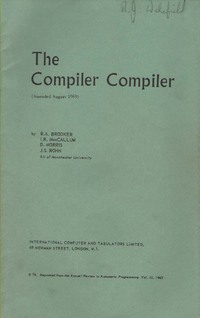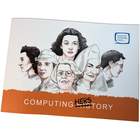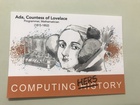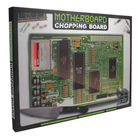The Compiler Compiler
|
Paper entitiled 'The Compiler Compiler' by R.A. Brooker, I.R. MacCallum, D. Morris, and J.S. Rohl. Reprinted from the Annual Review in Automatic Programming Volume III, 1963. A compiler-compiler or compiler generator is a tool that creates a parser, interpreter, or compiler from some form of formal description of a language and machine. The earliest and still most common form of compiler-compiler is a parser generator, whose input is a grammar (usually in BNF) of a programming language, and whose generated output is the source code of a parser often used as a component of a compiler. Similarly, code generator-generators such as (JBurg) exist, but such tools have not yet reached maturity. The ideal compiler-compiler takes a description of a programming language and a target instruction set architecture, and automatically generates a usable compiler from them. In practice, the state of the art has yet to reach this degree of sophistication and most compiler generators are not capable of handling semantic or target architecture information. We are extremely grateful to both Dawn and Kim Wakefield for the kind donation of the collection of their late father Richard Wakefield. Date : 1963This exhibit has a reference ID of CH15627. Please quote this reference ID in any communication with the Centre for Computing History. |
Click on the Images For Detail
|























